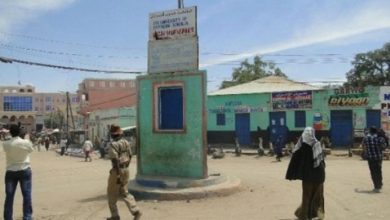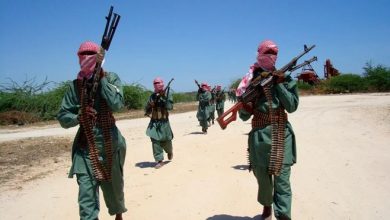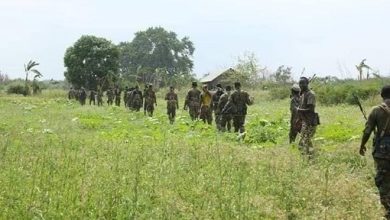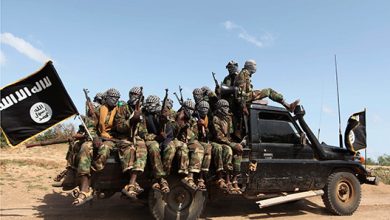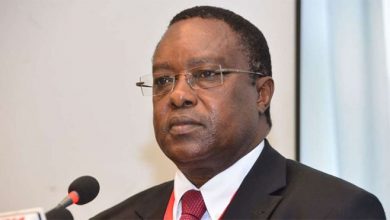President Farmaajo’s Addis Ababa Interview fully transcribed, 1 with critical commentary (Part 1)
Welcome to part 1 of an English transcript of President Farmaajo’s recent interview in Addis Ababa, with critical commentary. The interview itself was conducted in Somali. I have transcribed it with the sole purpose of producing a translation that is not only faithful to the spoken word, but also clear and easy to read. I must say President Farmaajo is not the easiest speaker to translate. His speech in the video is poorly constructed and jumbled up. I feel I have done my utmost to convey his message accurately. At the end of the final part, I shall present a brief content analysis of the whole interview and measure it against core concepts related to the critical leadership responsibilities required of a leader of a nation emerging from conflict.
Welcome to part 1 of an English transcript of President Farmaajo’s recent interview in Addis Ababa, with critical commentary. The interview itself was conducted in Somali. I have transcribed it with the sole purpose of producing a translation that is not only faithful to the spoken word, but also clear and easy to read. I must say President Farmaajo is not the easiest speaker to translate. His speech in the video is poorly constructed and jumbled up. I feel I have done my utmost to convey his message accurately. At the end of the final part, I shall present a brief content analysis of the whole interview and measure it against core concepts related to the critical leadership responsibilities required of a leader of a nation emerging from conflict.
| TS: [00:11]
Q1: Assalaamu aleykum … welcome to this interview with the President of the Federal Government of Somalia (FGS) Mohamed Abdullaahi Farmaajo who have come here to take part in the African Union Ordinary Summit held in Addis Ababa in the past few days. Welcome, Mr. President, and thank you for giving us this opportunity to interview you. The theme of this 33rd African Union Ordinary Summit was “silencing the guns” and when you reflect on this agenda in relation to Somalia, [you will know that] it is one of the areas of conflict. What have you taken away from your meetings with African leaders and others in terms of firm pledges of support to help you address the conflict and the difficult issues in Somalia?
|
| TS: [01:00]
A1: Bismillaahi rahmaani rahiim … [extending compliments to Universal TV]. If I answer your question, this was an ordinary African Union summit of leaders and the theme, as you said, was to stop all forms of fighting and conflict … to silence the guns. This was really a very fruitful and productive meeting and, for us, we took advantage of this to argue for the lifting of the [UN arms] embargo as we are fighting against an international terrorist group, and now really is the last time when the terrorists in Somalia are being directly and forcefully challenged because the truth of the matter is that if they are not completely overcome, it is possible that they could come to Somalia’s neighbouring countries and create problems ‘there’ [sic]. Therefore, [we argued] that the embargo that was imposed on us for a longtime, and which also affects some other African countries [be lifted] in order for us to fight and to obtain the equipment that we need [to fight] the terrorists that have been causing problems to Somalia for a longtime, and caused death and destruction.
|
| Comment 1 Mr. President, with all due respect, this is an old trite, not original at all. All governments before you, starting with President Abdiqasim’s TNG, argued for the lifting of the arms embargo imposed on Somalia in 1992, with variable outcomes. The issue here must be your definition of the phrase ‘silencing the guns’. At the level of the AU, it must mean to seek to develop, where possible, avenues for cooperation to reduce violence and terrorism. Because it is this violence and terrorism that so blemished human history, and now threatens the future of Africa’s children in various war-torn countries including our own. In the context of Somalia, silencing the guns must surely mean moving away from militarization of society and addressing the underlying root causes of conflict, such as corruption, injustice and inequality, exclusion, discrimination and marginalization, extreme poverty and lack of livelihoods, and youth unemployment – to name just a few of the interminable drivers of the conflict. It is wishful thinking to believe that terrorism can be ended in Somalia by President Framaajo’s glib answers in this interview. Ending terrorism would entail, among other things, changing the political reality and mentality that engender it, and the institutionalization of democratic legal authority (repeat democratic legal authority, not authoritarian leadership that has no respect for the rule of law as President Farmaajo seems to have been conducting himself in the recent past) that can create the conditions necessary to mediate competing domestic interests and to address the root causes of the conflict peacefully. That in turn requires you as President to be able and willing to build the unity of purpose necessary among the FGS and FMSs to fight against Al-Shabaab and to foster peace and reconciliation, and with a focus on results. Mr. President, you failed in this task and, with it, the ability to build and maintain legitimacy in your government.
|
| TS: [02:40]
Q2: OK … during the time that you were here in Addis Ababa, we have seen the coming of the third anniversary of your taking office as President of the FGS. Do you think that you have achieved a lot in these three years, and are you satisfied with your accomplishments?
|
| TS: [03:03]
A2: … as you said, this change that has happened 3 years ago was really a new change that was welcomed by the Somali people wherever they may be, and especially the way the election was conducted. [In that election] people were selected on the basis of experience in government, people who were already tested in the job, and I became the person who was entrusted with [the task of] leading the country. People had very high expectations which really put huge pressures on us in terms of managing those expectations. Because there was a long running civil war in Somalia; there was [also] a time when there was no government, the first 10 years; the government could not pick up in the next 20 years as there were conflicts surrounding it. So the people expected, once a new government came and I was elected [as leader] because of my experience as Prime Minister for 8 months, and the things I have done (?) in that time period. People expected that I could change a lot in the country. Not only that I could change things but that I could immediately [overturn] the damage that was done in the past thirty years [the President is mathematically-challenged. He came to power in the 27th year – not the thirtieth year, after the collapse of the later dictator’s regime], and that my government can lead the country into real progress and prosperity. And that is difficult because the destruction that was inflicted on Somalia was not a simple destruction, and it has taken the country backward. [To fix this] requires many years and patience. So that election [still on the election through which he came to power] was one whereby people with experience and people who were already tested stood for election. The reason that made people see experience as important is because when someone has experience for the job, like in the rest of the world, that person has a plan and how he/she would implement that pan. So the way we understood and believed [that] what was wrong about Somalia was lack of political stability … Secondly, what was needed was good governance that was set out in an honest way. Not that the person wants that the government is good, but that the leaders are honest about it and that they set the example, that they truly become the ones who are undertaking the change for good governance. And truly we have been true to that. The thing that we have accomplished is that this government has brought about political stability, and also good governance. But still we have a problem with managing people’s expectations that this government will lead to prosperity and that all the destruction and problems that occurred will be overcome within a short period of time. And that’s something that Allah can do because we are left behind by our neighbouring countries and by others in the international community. Huge destruction has been wreaked on this country, be it on people or on property, or both; and it will take a longtime to recover from this.
|
| Comment 2
Mr. President, you have ignored the question and subjected the reporter to a long monologue on various political claims. In the English language dictionary, a claim is to say that something is true or is a fact, although you cannot prove it and other people might not believe it. The sad reality is that the President’s claims could have all been answered longtime ago by other politicians if he and his government had shown a responsible attitude towards the practice of political competition. But we know what happened! You and your government had completely muzzled opposition both inside and outside Parliament so you wouldn’t hear the other side of the story. We also know about the dirty tricks department run by your government, using an army of social media loonies, spreading disinformation and conducting underhand activities and machinations to discredit your political opponents. As your Prime Minister is reputed to have once famously said, “For us, the enemy of Al-Shabaab and the enemy which is the opposition to our government are one and the same, and we will deal with them in exactly the same way,” your government has been at war not with the bad ideas of division, hate and extremism peddled by Al-Shabaab but with political opponents.
History may be important, but it is a given, not a policy tool. Your histrionic gestures about the past do not do justice to the painful lessons of our recent history. That history consisted not only of the ‘destruction’ that you endlessly point to, but also a long reign of terror by a dictatorial regime that was repressive to its own citizens with predatory rapaciousness resulting in interminable civil wars, gross human rights violations and the flight of millions. That earlier history is much more pertinent to what’s happening under your administration today.
The President claimed to have instituted good governance. The very idea is utterly preposterous. Nations that have good governance deliver political goods such as security, rule of law, political freedoms, economic opportunity, education, healthcare, and a functional infrastructure. Farmaajo’s government provides little of those goods, except for denial and oppression, and a disdain for the rights and liberties of its own citizens. As I write, sources inside the city tell me that Mogadishu has been in total lockdown over the past many months with checkpoints, revival of militarism, and a roguish government behavior everywhere. They say it is like a throwback to the old days of the late dictator’s repressive regime in the 1980s. This should come as no surprise. What you have for a government under Farmaajo is a system led by a cabal wielding unconstrained power and accountable to nobody, who are operating to enrich themselves and augment their power at the expense of the rest of society. There can be no good governance without transparency and accountability. Wherever parliament does not hold the government to account, and doesn’t undertake the crucial oversight role of checking its excesses, any claim to good governance has a hollow ring. That exactly applies to your government, Mr. Farmaajo.
The claim that your government’s reliance on a narrow clique of persons to govern, typically utilizing patronage networks including politicized federal security and intelligence institutions represents political stability is not only intellectually dishonest; it is a travesty of justice. Somalia’s recent history manifestly proves that such a governance model ultimately hollows out. The nature of exclusive power-structures demands that a disproportionate share of opportunities and resources flows to those with privileged access. Inequities and corruption are part and parcel of this system as it must pick which interests it will favour and which it will suppress. As such, Mr. President, your regime violates the principle that government should do no harm.
The President often talked up about winning the election [of 2017] on the basis of his experience, and being the best candidate. Well, no dispute that he had won; just not sure that he had presented concrete ideas or policies to win power. But that is not surprising given that elections here are mostly having enough money and endless political maneuvering, thrown in with a game of chance. Mr. Farmaajo’s failure to say even a few words, let alone make a victory speech that captures the moment, when ushered to the podium just minutes after winning the election, in the afternoon of 8 February 2017, was a fitting testament to his lack of preparedness for office.
|
| TS: [06:10]
Q3: Leaving aside people’s high expectations and the conditions that existed; during your election campaign, the words you often used which people liked included that you would do a lot about security, good governance, bringing about political stability, and especially [that you will tackle] corruption. Let us start with security, In the 3 years that you were President of Somalia, Al-Shabaab continued to perpetrate [car bombing] explosions that cost many innocent lives, the last one being in Ex-control. Also the ones in Zoobe, SYL, etc. In your campaign slogans, you said that you were going to make the Capital City safe, that roads will be open for public use, and that you would deal with Al-Shabaab forcefully. Leaving people’s expectations to one side, would you say that a lot more could have been done in relation to security but that you fell [far] short?
|
| TS: [07:08]
Ads By Google A3: … the enemy we are fighting are terrorists. It is not an enemy that you can see or [know] their whereabouts so that you can attack them, or will attack you directly [sic]. This is an enemy that is hiding among the people… and ‘we succeeded in preventing them from attacking our brave army’ [sic]. They are hiding [among the people] and attacking public places with explosives, subjecting [pain and suffering] to innocent civilians, including women, children, the elderly, the young and everybody else. Such things happen everywhere. Our view is that this enemy we are fighting has been in the making for over 10 years. Where I said the country needed political stability was that when a government comes to office and put in place its own plans, and [starts] implementing them, it needs time. But they [Al-Shabaab] took advantage of the in-fighting in the successive governments that came before me where a new government and Prime Minister would be brought in every year, causing the government to go backward. [As these governments regressed] they [Al-Shabaab] were improving their techniques in explosions, in hiding among the people, in intelligence etc. Therefore, the things that we really believe made us succeed in reducing the explosions in comparison to the previous government where explosions used to happen on a weekly basis, whereas now it is possible that sometimes a long time goes by with no explosions. The reason for this [difference] is the better training we provided with our forces, that we have uplifted their morale by [regularly] paying them, [that is why] they are engaged and combat-ready to defend their country. Fighting against terrorism takes a very long time. We’ve in fact started and, apart from [political] stability [sic] … that we find time to think, to plan and to work together. Next comes ‘good governance’ which itself means that we raised government revenues, and that we pay all staff salaries. So added all of these together, I think we can overcome this enemy that is causing the suffering to our people within a short period of time. |
| Comment 3
Mr. Farmaajo is in complete denial about the state of play under his watch. Let’s hear what the UN envoy James Swan said to the Security Council a mere two weeks ago: “Unfortunately, military operations have slowed since mid 2019 and force generation [number of military personnel recruited and trained] has, to date, not been sufficient for the tasks required in 2020, including priority operations against al-Shabaab and for re-opening Main Supply Routes. Despite efforts by the SNA, AMISOM and international partners, regrettably Al Shabaab retains the ability to conduct large scale attacks in Mogadishu, including against the UN and the international community, and in the recently recovered areas in Lower Shabelle. It is also able to generate significant revenues through extortion, and to conduct operations beyond Somalia’s borders.”
He goes on to say that the Somali government must clarify its operational priorities and comes up with the necessary forces to enable operations to degrade al-Shabaab, defend recently recovered areas and reopen main supply routes. And in so doing, there must also be respect for human rights coupled with the return of legitimate local governance and the rule of law to maintain stability in these areas.
That, I think, is the nub of the problem for Mr. Farmaajo and his government. Their priorities are twisted and they have no regard for constitutional conventions, such as human rights, return of legitimate local governance and the rule of law. His forays into Gedo, Galmudug and, as a credible rumour suggest, might also attempt to foray into Gaalkacyo paint a man whose norms and ethics of militarism and intoxication with bombastic and militaristic pseudo-nationalism, the bitter fruits of which we have reaped before, might bring the whole house down on top of everyone.
The claim by Mr. Farmaajo that his government increased revenues cannot be verified in a country where there are no independent institutions. But even if that is the case, can you give us a breakdown of how these extra revenues have been spent? Who benefits from them? I have already dealt with his bogus claims about political stability and good governance under comment no. 2, above. The rest of his answer to this question is just about shifting the blame for his failures to his political opponents in the previous administration.
|
| TS: [09:46]
Q4: … administrative structures [continue to] exist, only government leaders change! So, if your time comes to leave office, do you think that the man who comes after you will start from zero like, for instance, when it comes to security, the fight against […]. Is there not a [bureaucratic] structure that will not be affected when the change comes?
|
| TS: [10:06]
A4: It is a good question. The more a country has a continuity of government … (uses the Somali phrase dowladdiisu is-daba-joog tahay and is really not the same as what he means which is a government that is in existence for a long time), that country achieves more development than [a country] whose governments change. Because when I look at the economy, if people want to invest in you, they look at the stability of your government. It must be a government that can complete the projects and the work that was started, and [it must be] a government that can fulfill the agreements entered. But if there is a continuous change, nobody will invest in you. The performance of [the government] is as you said, it is possible that the new people who come [to form the new government] may start from the beginning because they do not understand [where things are]. When I go back to it, what the people were electing was experience [still on the election through which he came to power], and that was right. Previously people used to elect new people, and the idea was to experiment. But on February 8th, it transpired that people really matured, that MPs matured and elected [leaders] on experience. And they selected from among those who were already tested. So in itself, the elections that are taking place in [every] 4 years [sic]. So the [idea of] government is that if things can be predicted, if what will happen can be forecasted, it means your trustworthiness will be OK and the people who want to do [deals] with you will trust that you will be there, and that they can work with you. So the change [of government] itself is part of [what causes] the failure that [we see] in the country. And when the change is taking place, that change advances the interest of an individual and doesn’t advance the interest of the country; but when the government is continuous (again using the Somali phrase dowladdu is-daba-joog tahay and is really not the same as what he means which is a government that is in existence for a long time), the interest of the institutions of government are advanced, the interest of the country is advanced. Because you have, I mean if the government is good; if the government is shoddy and has been associated with corruption or it’s a government that is not doing much or leading to progress, that is one thing [sic]. But if the government is working; has the trust of the public; fighting against corruption; and making noticeable progress on a daily basis; necessarily it is right that that government carries on working.
|
| Comment 4
The question was about what institutional structures will carry on after the leaders of this government leave office? But the President seems to be pursuing peculiar personal visions and (possibly) ‘phantoms in the brain’ so he chose to answer a different set of questions which clearly lay bare his increasing arrogance and vanity.
He claims, for instance, that others (who?) will trust him if it could be predicted that he will be returned to power after an election. He also suggests that the 4-year election cycle that brings about change and new leaders is responsible for the failure (lack of achievement by successive governments) that we see in the country. He then comes up with the completely ludicrous idea that any change (of government leaders) that takes place advances the interests of an individual whereas if the incumbent stays on and there’s no change, that will advance the interests of the institutions and the country! Most shocking of all his bogus theories is the one whereby he claims that because his government, in his words, “is working; has the trust of the public; fighting against corruption; and making noticeable progress on a daily basis; so it is compulsory and right that it carries on working [beyond the expiration of his term?]”. It’s a pity the poor reporter didn’t put that last question to him, but Mr. Farmaajo forcefully made that statement.
Now we must ask how would Mr. Farmaajo want to manage to stay in power beyond his term – because that is something he’s clearly putting forward as a proposition? Before the modern globalized age, the all-powerful leaders and presidents for life (including our own late dictator) survived by being ruthless, by creating an effective apparatus of intimidation, by socializing their people to accept a massive degree of implicit coercion and conformity, and by naked force to cow a potentially restive population and impose subservience. Is that something President Farmaajo would want to do? And can he possibly do it in Somalia in the months ahead? We’ve still got many months to go, so I am sure the President would have plenty of time to ponder over these questions.
The World Bank has defined corruption as the abuse of public office for private gain. Mr. Farmaajo accused his predecessors of corruption and incompetence, and claimed umpteen times in this video interview alone that his government is tackling corruption. This, of course, is not the place to examine corruption in Somalia, but let’s just accept that Somalia ranked bottom (most corrupt) in every year of the past 15 years in Transparency International’s perceived levels of public corruption index which ranks 180 countries. The government of President Farmaajo has only existed for three years, but what exactly has it done about corruption? It is not good enough to just say we’re tackling corruption! What anti-corruption initiatives has the government come up with? What clear policies and guidance has it put forward? What about its finance, revenues and expenditures? Can those be made public? Can the government account for its extra-budgetary funds, such as the “…off-book funds President Farmaajo apparently received from Fahad Yasin, Head of NISA and his chief liaison with Qatar?” (Source: Washington Examiner, January 23, 2020).
Postscript In parts 2 and 3, I shall be using excerpts from the interview rather than fully transcribed questions and answers to reduce excess verbiage. Dr. Aweys Omar Mohamoud (@AweysOMohamoud) has a PhD from the Institute of Education, University College London (UCL). He has recently worked as an advisor to the Ministry of Education, Culture & Higher Education (MoECHE), Federal Government of Somalia in Mogadishu. |
